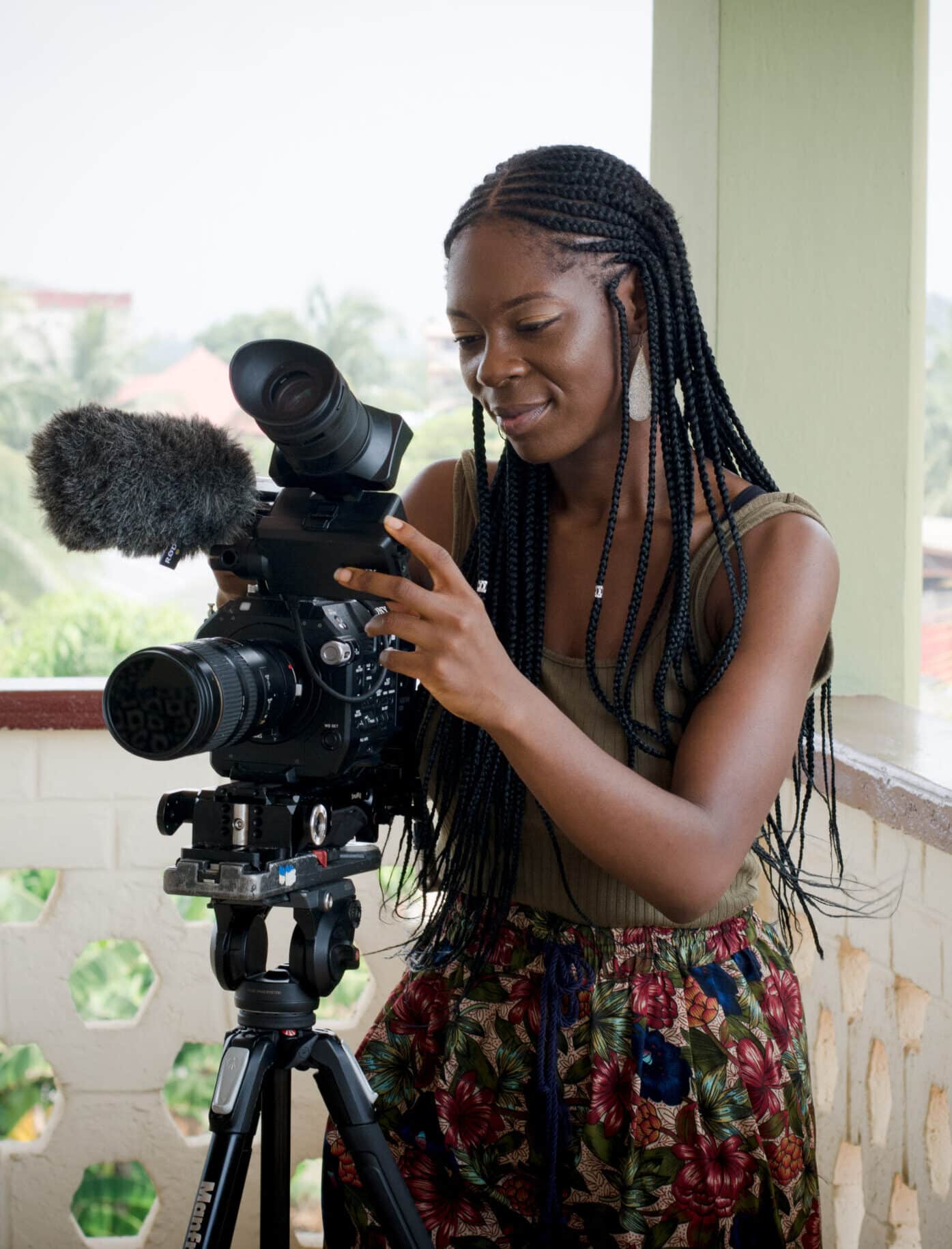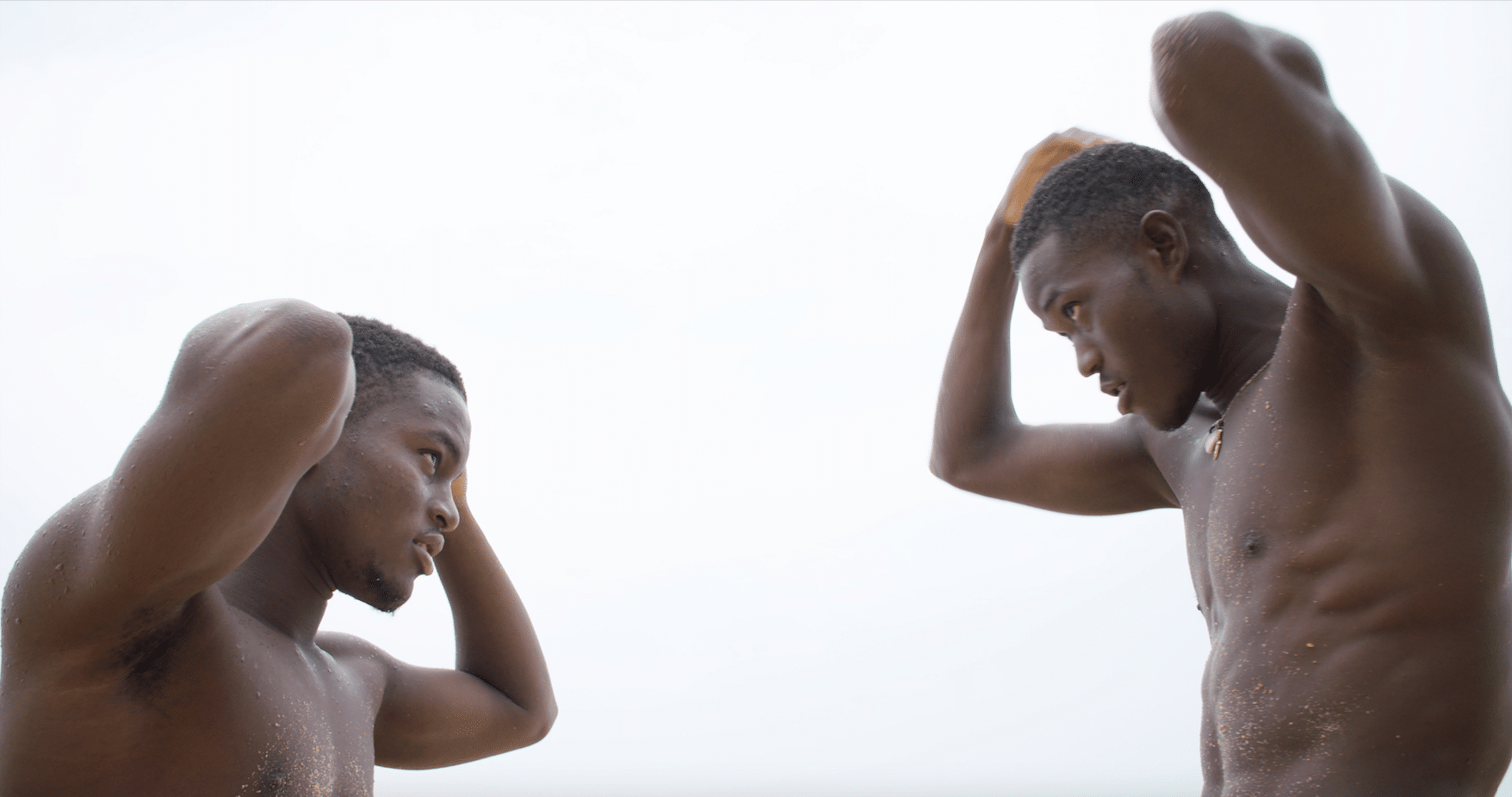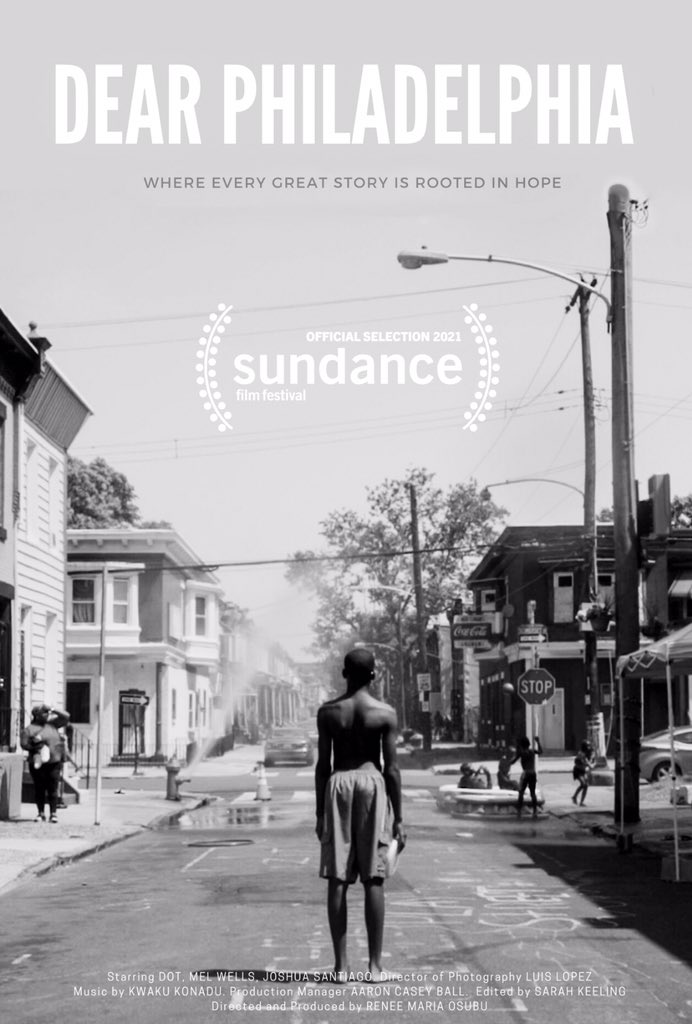Project Forte is a compendium of interviews tuned to the frequency flowing from creatives working within the Philadelphia film industry. Our goal with this initiative is to promote a continuing conversation around the responsibility we have as storytellers and to amplify marginalized voices deserving of recognition and opportunity. The project bears witness to their unique experiences, issuing a sense of empathy and honor for these leaders and their innovative teams. Each story, profound and vulnerable, sheds light not only upon the status quo but also upon ways to challenge it respectfully. By exposing their struggles and successes, these industry professionals have compelled others to ally around each other in solidarity, recognizing that there is space for everyone, and proven tools to create safe sets for collaboration within our community.
Our final interview for 2021 features the incomparable Artina Michelle (she/her), a Liberian-American filmmaker who reminds us that “cinematography is the rhetoric of film.” Although at home behind a camera, Artina is able to speak candidly about both recognizing and challenging fear. That we have a responsibility to recognize our talents and use them, regardless of roadblocks and lessons yet unlearned. Ultimately, pinpointing fear and rushing headlong into it is the fastest way to reward. Read on to hear more about her latest documentary This Too is Liberia and the talented collaborators working with her!
Written and Edited by Kate Feher
_________________________________________________________________________________________________________________
Artina Michelle: My name’s Artina Michelle and I’m a director of photography in the process of co-directing and producing my first feature film, This Too Is Liberia.
Kris Mendoza: Born and raised in Philadelphia?
Artina Michelle: I was born in Staten Island, New York. I was raised in Philadelphia.
Kris Mendoza: Talk to me about how you got started in the film industry. How early in your life did you know this was what you wanted to be doing for the rest of your life?
Artina Michelle: The earliest memory I have of film is when my mom bought a camcorder for one of our family reunions. My older sister and I would take it and make home videos. We used to do remakes of MTV Cribs, just random things. We did our first short film, edited everything in camera because we didn’t know how to edit. My brother would make cameos. It was just something fun that we would do. I didn’t take it seriously at the time.
Kris Mendoza: Just so I can place us here, is this Mini DV, Hi8, VHS? What era are we talking here?
Artina Michelle: Yeah. I don’t even know the name for it. It was one of those camcorders with the cassettes.
Kris Mendoza: It was a mini cassette like… Yeah, Mini DV or HDV, depending.
Artina Michelle: Wait, does that make me old?
Kris Mendoza: Ha, no, it’s cool you grew up in the analog era. You touched some analog tapes. That lets you straddle both cool old school and new age.
Artina Michelle: Vintage, I’ll take it. Anyway, as I got older, I thought I wanted to act, but I was too ashamed or afraid to say it. Fast forward to college, I thought I would be going into psychology because I did well in an AP Psychology course in high school. But I knew I didn’t really want to do that for the rest of my life. The acting thing was still in the back of my head, but… I’m a first generation Liberian American and I felt like I couldn’t tell my African parents I wanted to act. I just didn’t feel like they would support that. They’re very academically driven.
Kris Mendoza: So you had the preconceived notion that they wouldn’t be into it. What’s a typical Liberian American career path you thought was expected of you?
Artina Michelle: Yeah, for sure. I mean, I believed it because I heard it. “You sure you don’t want to be a nurse, a lawyer, or an engineer…” just different conventional paths that a lot of immigrants see as profitable.
Kris Mendoza: But you declared your major as film, the actual major cinema, and then your parents didn’t need much convincing. Were they supportive after all?
Artina Michelle: Yeah. I think what it was was my dad saw that I was really going hard for video work. I was doing events at that time. I was shooting music videos. I was shooting anything that I could.
Kris Mendoza: Ah, and he saw the passion?
Artina Michelle: Yeah, that and I started making money. I started making money from shooting events, and then that’s when he was like, “Okay…”
Kris Mendoza: “This is a career.”
Artina Michelle: Yeah. I think when I did my first event, it was either a wedding, or baby shower, or something. I got that paycheck. My dad was like, “They paid you all for this? … Okay, we’re in America. Here, children can do different things.” That was it. After that, he was really supportive.
Kris Mendoza: Ha, like, “What? They’re paying you money for this?”
Artina Michelle: Yeah and that all started in college. I got advised to take a film analysis course as an elective. At the time, I was undeclared at Temple University. I didn’t think I would care too much about this course. I was just trying to get close to the theater but in this course I learned about cinematography. It reminded me of an English class I took that had to do with rhetoric.
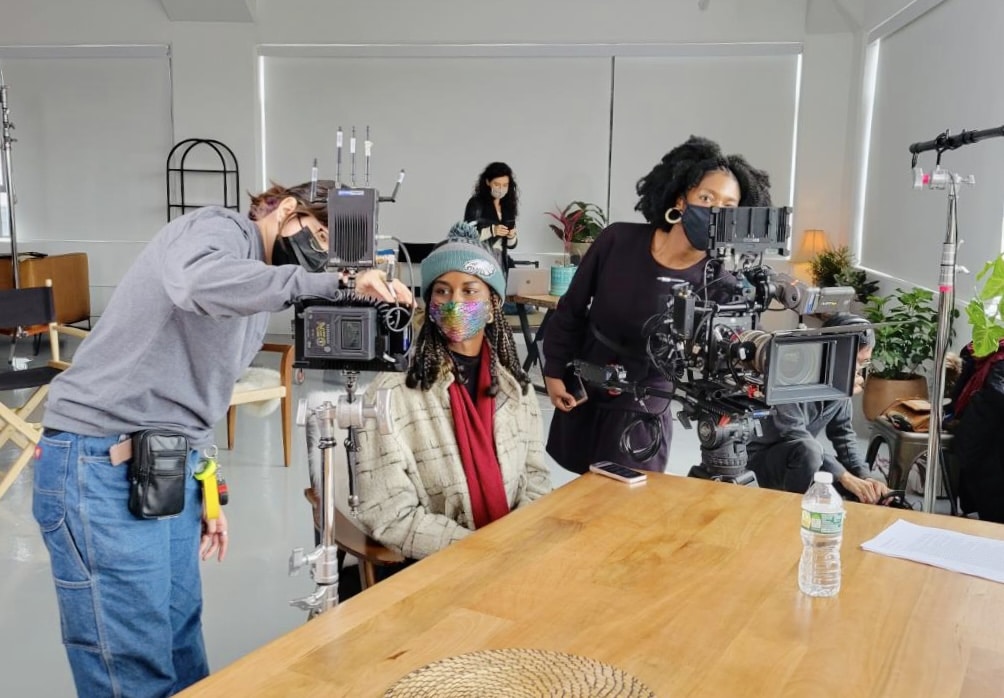
To me, cinematography is the rhetoric of film. It’s the visual language, and that’s something that really interested me. After that, I bought a camera. I taught myself how to edit. I finally took the plunge. I picked my major which was film and media, and told my parents. They saw I was so passionate about it, so they actually did support me to my surprise. I started interning for FreshFly. After that, it’s just history.
Kris Mendoza: That’s right! I don’t know if you remember how we met, but you were renting our studio. Then, I think it was Greg Heller, who was working with you at FreshFly, who had come to Maestro to edit right around the same time you arrived. You guys saw each other in the hallway and I thought he must have been a Temple student with you. It was such a coincidence…
Artina Michelle: Oh yeah, I forgot about that!
Kris Mendoza: That’s Philly production world for you, small world. Was that 2014?
Artina Michelle: It was! I’m surprised you remember the year.
Kris Mendoza: To that end, walk us through your work since? In what way did film school equip you for the workforce and really starting a career out there?
Artina Michelle: Yeah. I would say one of the biggest things I got out of film school was a network. I got a chance to connect with different people. A lot of my peers are doing some major things. I’m super inspired by them.
Kris Mendoza: Yeah it’s a safe space to put yourself out there and find different pockets of people. I always say to folks working in Maestro, being a people person is just as big of a part of this business as being a technician or creative. Getting along with people, and having them remember you, pulling you onto other jobs, giving you opportunities and stuff. In that regard, I think it’s worth noting. Are there any people, whether it’s companies/organizations that you feel really helped you open up new networks and start to try new things? I know you mentioned FreshFly is one of them, but how does one transition from student trying to build a network, to being known for a position, and then getting calls and getting work?
Artina Michelle: Oh yeah. I would say it was FreshFly, then Maestro, you all really hooked it up, and Carron Willis at Alkemy X. I think my network got much bigger through PA-ing with Alkemy because I met Marcus Clarke, a talented director, who ended up getting me on the set of Creed II.
That was a formative moment for me. I was doing the best that I could on those jobs – they had me on background and stuff – but I was also already doing DP work as a side hustle. So by the time I got on Creed II, I was already nearing the end of accepting PA work… then, someone got me really upset on set one day and I was like, “I think I’m over it. I think I’m better than this.”
I was like, “Let me just go talk to the DP real quick, and tell him I’ve been inspired by watching him work.” I was going to tip my hat and go. But just through having a conversation with him, that turned around. That day I was told I got moved to the camera department as a camera PA. That got me specialized in what I was actually interested in which was camera work.
Kris Mendoza: Was that a turning point for you in terms of specialization and the like?
Artina Michelle: Oh, I’ve always called myself a DP from the beginning. Even when I was interning, I was like, “I’m a DP, I’m a cinematographer.” I knew that, but when I first went into the industry, it was as if I couldn’t say that. People advised me not to say it.
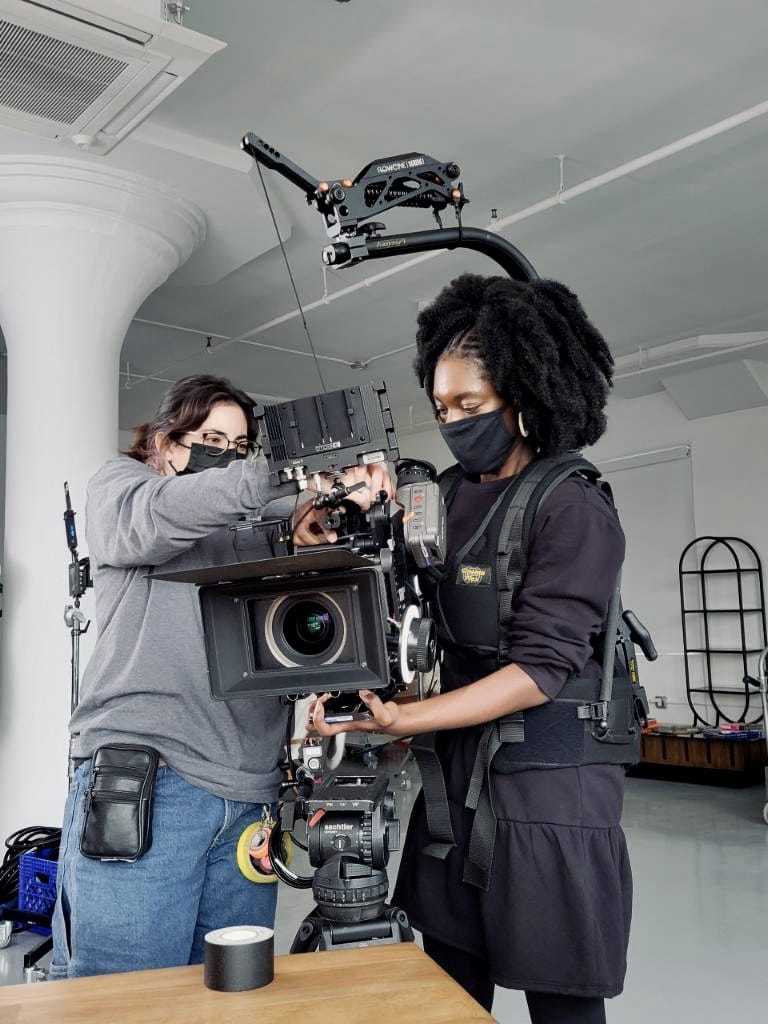
Kris Mendoza: It felt like it was a title you had to earn?
Artina Michelle: Yeah in a sense.
Kris Mendoza: It’s interesting. Right? There’s an older DP that we work with who you know, and he mentioned, to this day, he doesn’t feel comfortable calling himself a DP. He is “the camera guy” because of the pressure and the weight that he felt like came with the title, but I think there’s a lot to say about just owning it and saying, “This is what I am, and these are the kind of jobs and stuff I want to be known to for and get called for.”
Why did you decide to draw a line and take only DP work moving forward?
Artina Michelle: Oh, wow. To be honest, it was a twofold thing. I was reading this scripture in the Bible, the parable of the talents which talks about how you should not bury your gifts, but use them. At the time, I really would sit with myself and think, “I’m still learning.” I’m ever-learning. I’m ever-growing, but at the same time, I don’t need to wait to take the leap. I know that I have the capability to have this title, regardless of what the industry was telling me at the time.
I think that goes hand in hand with what you’re talking about concerning identity too. It’s something that you have to find within yourself – to say, “This is who I am, and this is who I’m presenting myself to the world to be.” One thing I found helpful at that time in my life was that I got to PA for a female DP – Oo, actually I don’t like using the word female to describe women.
Kris Mendoza: Non-male.
Artina Michelle: Ha, right. I should say I was on set with a woman, Julie Kirkwood, and she was a DP from LA. I just didn’t see a lot of women DP’s in Philly at the time, and our B-cam operator was also a woman too. Basically, seeing them just added fuel to the fire.
Kris Mendoza: Digging into the experience of not seeing a lot of non-male representation on the set… it sounds like you felt it drove you to be even more forthright in your mission to become a DP, yeah? Had you seen that as a main obstacle?
Artina Michelle: To be honest, my gender didn’t really cross my mind when I was choosing my career. I’m confident that everyone’s path is different. Everybody has different ways to get to their destination, you know? I had the confidence that if this was for me, that was going to be true whether I’m a woman, whether I’m black, whether I’m young, you know, or something else. If it’s mine, it’s mine, and no one can really take that from me, basically.
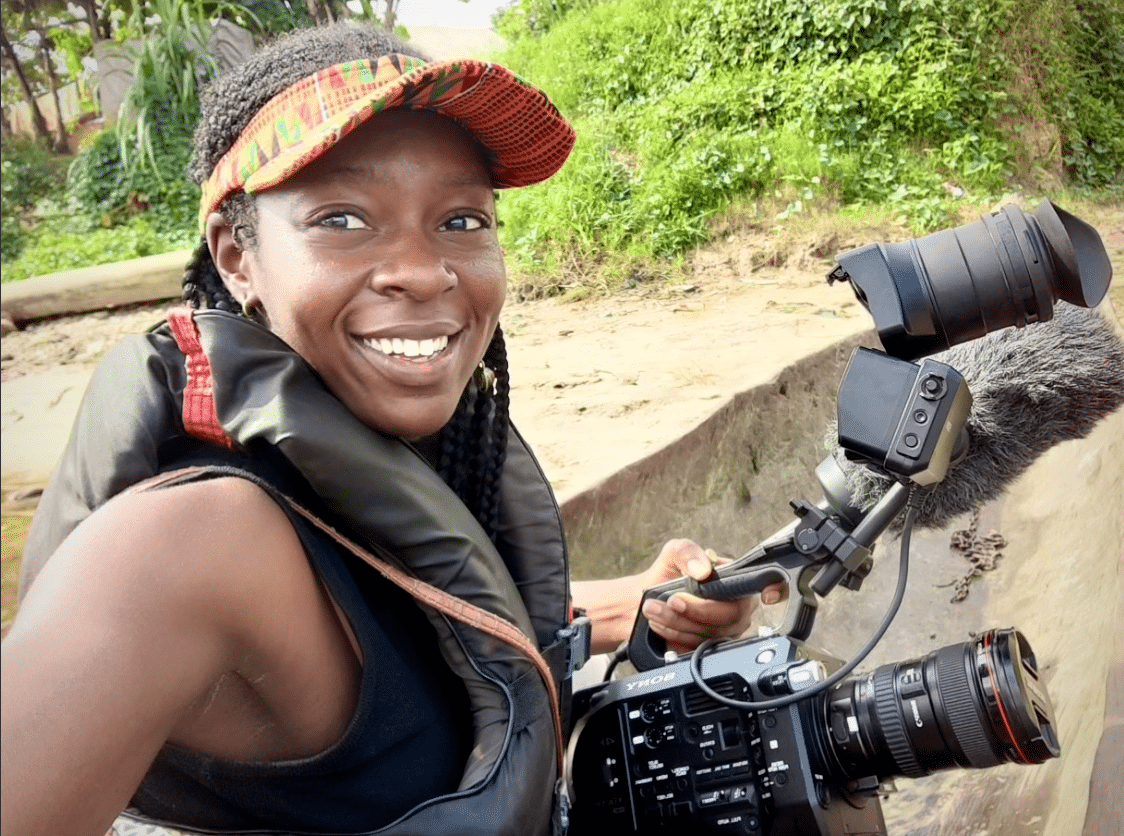
Kris Mendoza: How do those circumstances all factor into creating you, the artist? Do you find yourself gravitating towards certain projects? Do you find yourself being comfortable on certain sets? Are you picking and choosing who you work with? How does all this factor into the creative approach?
Artina Michelle: Yeah, that’s a good question. Even with confidence, it’s definitely challenging. When I was learning about lighting, it was hard to be around a whole bunch of guys who were grips and stuff, especially having smaller arms like I do. That’s not a woman thing, that’s an Artina thing (jokes).
I think I was there for the knowledge, but definitely had to deal with a lot of male ego and people who were trying to fight their way to the top. People are crabs in a barrel when you’re in a small market. Then for me recently, or when I defined myself as a DP, I had to find my voice within what I wanted to do because now I’m making creative choices.
I realized that in film school, I was taught a very Western-centric way of thinking about film that didn’t resonate with me, to be honest. What I was told was good, I didn’t think was good.
Kris Mendoza: Is this from a story sense or technical approach?
Artina Michelle: I would say story. Technical was good, but… There are certain films that are American classics which I don’t find…
Kris Mendoza: There was zero cultural experience for you. As an American, you’re like, “None of this resonates with me whatsoever.”
Artina Michelle: Exactly. When I would get a chance to speak in my courses, I was made to be the issue. “You’re the person who doesn’t understand high cinema,” basically. The culture that I come from is much different from the people who are creating these things. It’s not to say that my opinions, or what I would want to see, or what I would want to make is wrong or lower class cinema, but it’s just… an untapped perspective basically. I had to realize that my voice is important and it’s comprised of my varying identities as a Liberian American, as an artist, as a black woman, and more.
Kris Mendoza: Only you can tell it, right? Quite frankly, with a lot of culturally driven stories, if you’re not telling it, who is? Someone may opt to write it, but if they don’t come from that culture, they may miss key elements or moods. I’m not necessarily getting to the point where, for example, only Filipinos can tell Filipino stories, etc.
But – it’s no secret that in the last year and a half or so, The US has become super race conscious. Some call it race guilt, this move toward intentional calls to hire minorities. I don’t know if it’s the optics that scare them into action or if there really is authenticity behind it. Do they actually want the right crew for this – to understand or appreciate it – or do they have their eye on a quota? Ultimately it opens the door for a lot of minorities in this filmmaking space regardless. It’s interesting because I think about it through the lens of being qualified. You talk about this inner validation, external validation, but ultimately it’s who’s qualified to tell what stories and who’s qualified to aid in the telling of it?
I’m curious to hear what your perspective is on this.
Artina Michelle: Yeah, It’s interesting because for me, I didn’t get an influx of jobs carrying the pretense of needing a black DP. I probably got maybe two jobs simply because the talent themselves said, “Hey, I want to see someone who looks like me on the other side of the camera.”
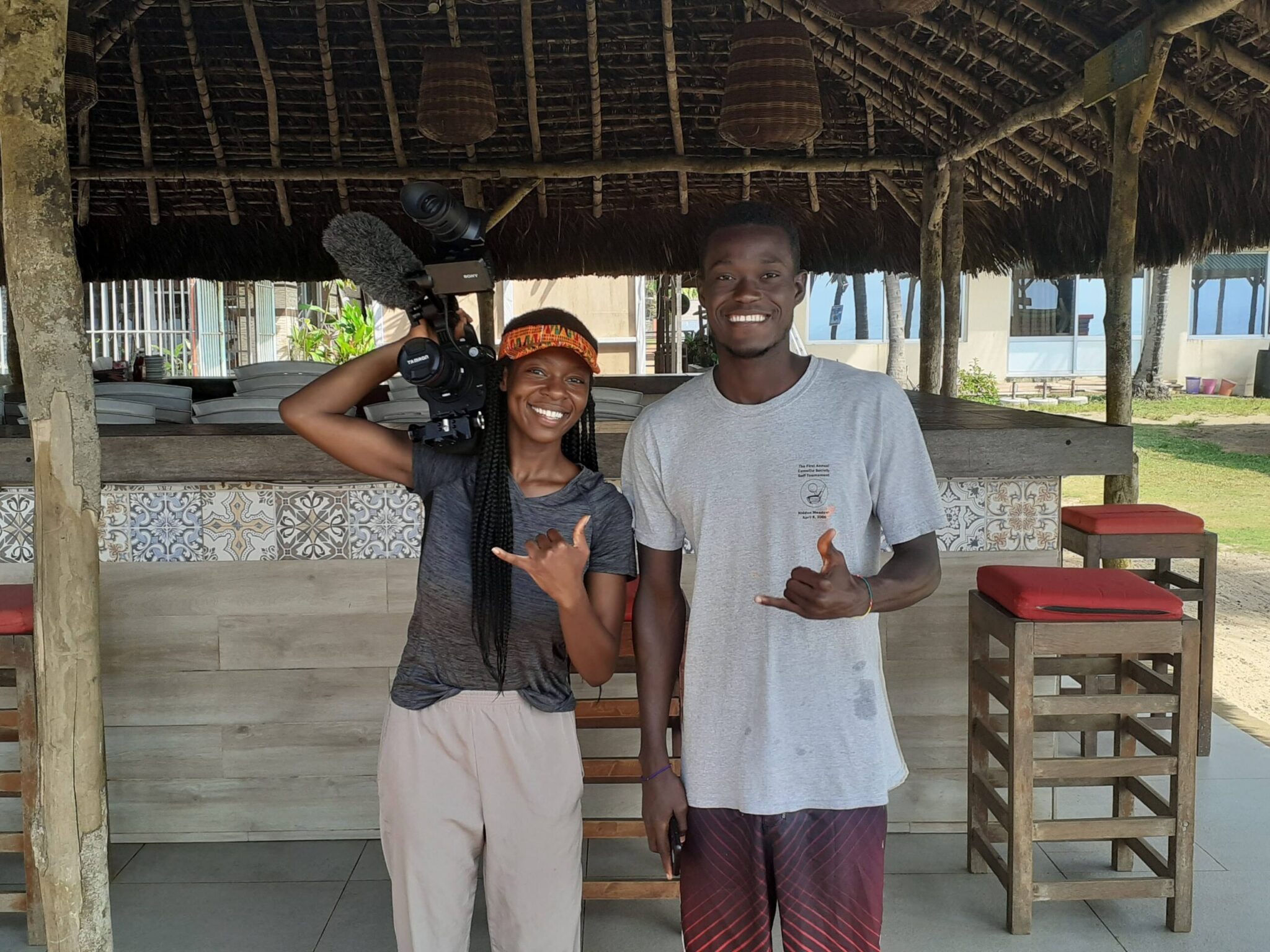
I’m learning that there’s just a long way to go. Last year was a revelation for a lot of people, but for my community, it was stuff that we were saying and experiencing for so long. I still feel that sometimes people’s advocacy comes off performative. It can be a little shallow without a deeper understanding of other cultures, other identities and experiences. I do think that, for the most part, we’re on an up trend though.
Kris Mendoza: Hopefully it sticks…
Artina Michelle: Yeah, exactly. I think I’m a little bit more cynical than others are, maybe. I just want to see longevity, but what I am interested in honestly is just the awakening that’s happening within black artists as well as other cultures and communities of artists. Basically, Americans and all our variations, like Liberian American, Caribbean Americans, Asian Americans, Black Americans… I just love that there’s a Renaissance of art that’s been going on for us.
The independent projects are the ones that I’m interested in. Recently, I was called for a shoot about black women who are preparing to deliver their children in the middle of America’s black maternal health crisis… that’s a story that needs to be told, and I believe that it can only be told from the perspective of the women who are going through it, or at least can relate to it.
Kris Mendoza: I think that’s a good segue then in terms of independent projects – can you talk a little about the documentary you’ve been traveling to Liberia for? I think it’s been a few years in the making. Can you give me the high level overview, and where you’re at, and what you’re accomplishing.
Artina Michelle: I started working on This Too Is Liberia at the end of 2018. I was fresh off the set of Creed II… and I just got rejuvenated by all the diversity that was on that project, for example seeing Steven Caple Jr., who is a young black man from Cleveland, directing.
Kris Mendoza: Non-female.
Artina Michelle: Yeah, for us to witness someone in this generation just killing it and making a project of that caliber, I got really excited.
I already planned to go back to Liberia at that point. Naturally, I wanted to create something there. I thought it’d be a short project, but I discovered that Liberia has a surfing counter-culture that is growing so I started connecting with that community.
Then I went for it.
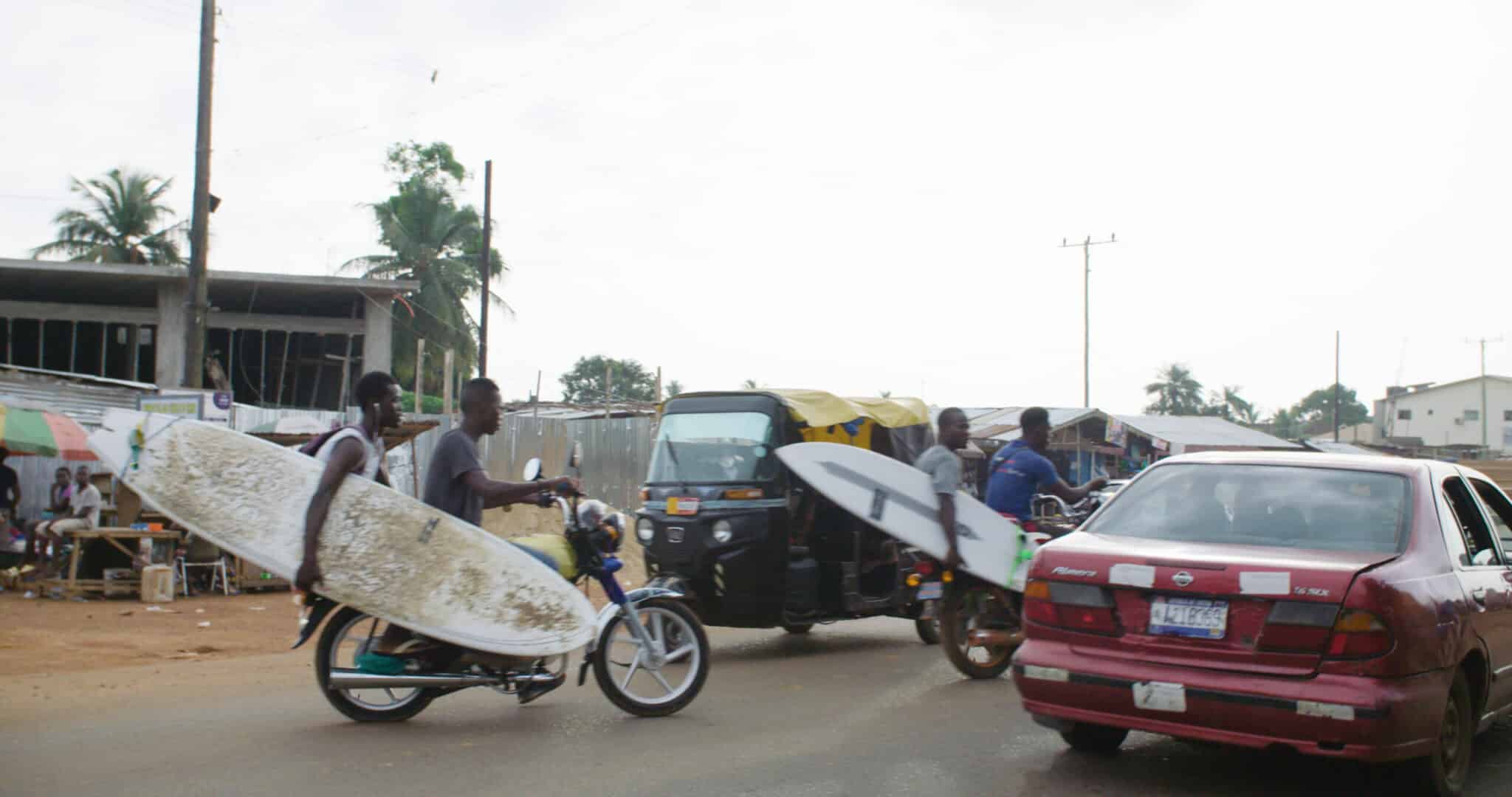
Initially, I went to Liberia for a month and started filming. I connected with my family over there – connected with my culture, my identity in a way that I’ve never done before.
Then I came back, thinking I would get a whole bunch of grants and everything would work out how I wanted it to, but instead had to wait a whole year and some change to go back to Liberia. It was during the pandemic that I actually went back for the second trip. That was fall 2020. I stayed there until February 2021. Now we’re close to the finish line. Thankfully, we just got approved for a grant a few days ago to finish the last bit of principal photography.
Kris Mendoza: Congrats. What have you learned as far as documentary filmmaking when it comes to you as an artist throughout this whole journey?
Artina Michelle: So, so much… The journey with this film has been impactful because I’ve been documenting this story for the majority of my 20s. I think that timeframe in anyone’s life is just… There’s a lot of growth. It’s been a lot of reconnection and learning about my family and about my history.
When I first started it, I was super excited. I was thinking, “Okay, this is going to be my first feature. It’s going to take a year tops.” All I wanted to do was show my homeland, and so, in a way, it was all about me.
Then, when I met the surfers, I learned that it was bigger than me. I wanted to do it for them. I wanted to showcase the people who were in Liberia, who stayed after the war. I realized they are basically my counterparts.
At that point, I started to put more pressure on myself. I was like, “Oh, this project needs to be good, and I don’t know if I can deliver.” I realized I had a fear of failure, and what I learned most through the documentary so far is overcoming fears and not letting fear rule me as an artist or even as a person.
Kris Mendoza: The game got big when you realized you really had something there.
Artina Michelle: Yeah, seriously. I was like, “Oh, okay. This is actually looking like it can be something.” Then I started to get fearful that it wouldn’t happen, that someone else, some Europeans – I know the French, in particular, do films in West Africa – would come in and take over the story. That became a fear of mine.
Throughout the project, I began to experience a lot of rejection, not getting the grants I was applying for. I was like, “If we don’t get this money, I’m not going to finish this project…” That rejection process really taught me a lot.
Then 2020 the world stopped. I thought, “I can’t push anymore for this doc. I can’t even leave the country. I can’t even leave my home, what now? What do I do with this time?” So I learned to let go, and that’s actually exactly what I needed.
There’s enlightenment on the other side of fear. Now I know, if I’m afraid of something that basically means I should go in that direction, to address it. Whatever my fear is, my treasure is on the other side. It’s just an indicator.
Kris Mendoza: And now you’re just rushing towards your fears?
Artina Michelle: I don’t know about rushing, but I’m definitely more inclined to use it as…
Kris Mendoza: As a Motivator?
Artina Michelle: Yeah, as a motivator. There we go. Now fear is more of a motivator.
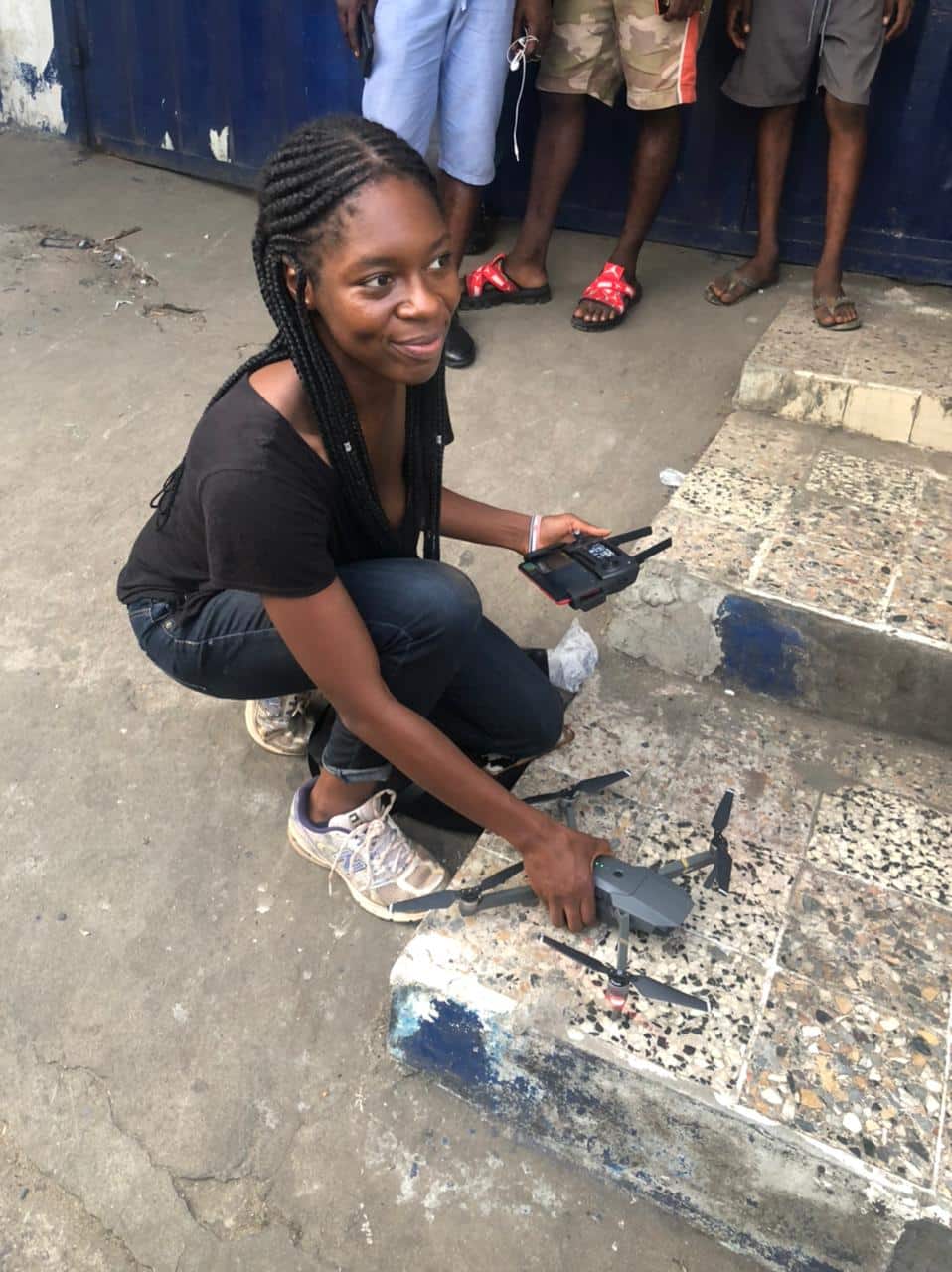
Kris Mendoza: That’s super powerful to mentally unlock that for yourself and also empower yourself rather than be too paralyzed to do what’s next. You talked about the fear of failure, and conquering fears, but also, it’s important to note that the creative process lends itself well to learning from failure, embracing failure. I think that those things go hand in hand.
When you look directly at rejection and failure, it makes you a better artist, a more resilient person at the end of the day.
Artina Michelle: It hits differently, fear of rejection, when it’s art that you’re creating, that you’ve become a part of.
Kris Mendoza: You’re more vulnerable, right?
Artina Michelle: Yeah. It’s very vulnerable, especially when the project is close to your heart like that, it’s close to your growth, and your identity. You may have people say, “We don’t believe in this right now.” And that’s tough but, that rejection is also creating the project, because every time I got rejected from a grant, I had to go back and revamp, rethink it.
Kris Mendoza: You asked yourself, “Why did I get rejected? What can we do better?”
Artina Michelle: Yeah, those questions are needed. I think all of it is needed for growth.
Kris Mendoza: Absolutely. So where can we find more information on this particular project? And also, there’s one other project that I’ve been following… Can you talk to me a little about Dear Philadelphia?
Artina Michelle: Yes, you can find more about the doc on my website, ArtinaMichelleDP.com there’s a tab for This Too is Liberia.
Dear Philadelphia… That started with the director, Renee Osubu. She is originally from London but would spend her summers volunteering with kids in North Philly. I met her through a friend of mine who I was going to church with at the time. He told me Renee was looking for a DP for her project. Originally, Dear Philadelphia was a photo series that she intended to turn into a short film.
It was true vérité style filmmaking. We were just rolling around and capturing people in North Philly. Renee didn’t tell me at the time, but she lost her father a few years prior to starting the project. It just so happens, the series is about black fathers in Philadelphia. I guess that was a turning point in her journey to make this project. I really was just there to help but every time I watch it, I tear up because I know that it was made with love.
I started out with them during the first half of production, but I had to leave to focus on This Too is Liberia. Then, she brought on Luis Lopez, a DP from San Diego. I was happy that they kept going. I had to bow out but I think that was the best thing that could have happened because Luis definitely did his thing on it.
I was still able to pop in on them throughout the summer, shoot a couple shots here and there. That’s how organic it was. It would be like, “Here’s a camera. Oh, you’re here hanging out. Grab some shots.”
Then it ended up just being massively successful and way more than we thought it would be. It is her first film and her first short. To me, watching that after being in the game for this long, and knowing how difficult it is for people to even just finish a short, let alone have it reach this level… I’m just like, “Wow. All glory to God.”
Kris Mendoza: And this is out for people to watch now, or it’s still running a festival circuit?
Artina Michelle: Oh, yeah. Dear Philadelphia is now available to watch on Vimeo Staff Picks. Aftering premiering on the British Film Institute online player. It had an International premiere at Sundance, screened and won at Blackstar Film Festival and is now an Oscar qualifier.
Kris Mendoza: I love to hear it, a lot of good stuff happening. Thank you so much for joining us and best of luck!


